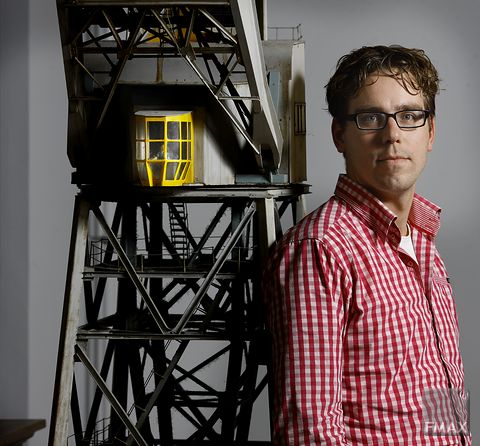Name: Teus van Vianen (31)
Nationality: Dutch
Promoters: Professor Gabriël Lodewijks and Dr Jaap Ottjes (Mechanical, Maritime and Material Engineering – marine and transport technology section)
Subject: Design and operational control of dry bulk terminals
Thesis defence: In 2.5
years
“Owing to the high demand for steel and energy, in the near future more terminals will be needed for storing dry bulk, such as iron ore and coal. In Europe, we’re increasingly looking into sustainable energy, but in countries with fast-growing economies, like China and India, the demand for cheap energy sources and steel will increase. Iron ore and coal primarily comes from countries like Australia, Brazil and South Africa. Terminals are built in harbour areas, as intersections between land and sea transport.
How should we expand existing bulk terminals or design new ones? There is hardly any existing literature on this subject. Much research has been done about container terminals, but not about dry bulk terminals, for which the building costs are considerable, given that large investments must be made in heavy equipment. An extensively researched approach is therefore a must. Consequently, my research is focusing on how to expand or build dry bulk terminals.
When a ship docks with iron ore or coal in its cargo holds, a grab crane is used to unload the ship. Belt conveyors then transport the unloaded materials to a stockyard machine, which stacks it in the stockyard. This may sound like a very straight-forward operation, but it isn’t, because one never knows exactly when ships will dock, as they easily get delayed by rough weather, like sea squalls, during the journey. And when a ship is unloaded, another ship could arrive that must be loaded. This has consequences for the belt conveyors being used, as well as for the machines in the stockyards. No one wants ships to dock for longer than necessary, because that costs money. Planners are therefore constantly busy selecting the right routes for the belt conveyors, and these planners all have their own methods based on personal experience.
I’m working on a simulation model containing smart algorithms that takes possible delays and disturbances to the machines into account. The simulation model also considers the optimal network of the belts.
I’ve visited many dry bulk terminals during my research and was surprised to find that the terminals want many of the belt conveyors to be flexible, so that they can be moved if necessary. However, it could very well be that the system works more efficiently and requires less maintenance when a majority of the belts are static. Hopefully, in two and half years from now, I will have succeeded in creating much more knowledge about how to build dry bulk terminals and a simulation tool for an optimal conveyer-belt network.”
Ze moeten zoveel mogelijk studenten op de been brengen voor de landelijke demonstratie in Den Haag op 21 januari, vinden de studentenbonden LSVb en ISO en de Landelijke Kamer van Verenigingen. Samen organiseren zij het protest onder het motto ‘Nederland kennisland, ambities in de prullenmand’.
Acties
Er is een website, er is een facebookpagina en er zijn kleine acties in aanloop naar het grote protest in Den Haag. Zo komt er een ‘studiemarathon’ van 72 uur: studenten en docenten in Utrecht, Groningen en Amsterdam zorgen om beurten voor een programma van 24 uur, waarin naar verluidt ‘alle wetenschapsgebieden’ aan bod komen.
Collegevrij
Enkele universiteiten en hogescholen geven studenten collegevrij, hoewel er wel tentamens worden afgenomen. De voorzitters van de HBO-raad en universiteitenvereniging VSNU komen naar het Malieveld om de menigte toe te spreken.
Extra collegegeld
De studenten verzetten zich tegen plannen van de regering, die studenten vanaf volgend studiejaar drieduizend euro extra collegegeld wil laten betalen als ze meer dan een jaar uitlopen in hun bachelor- of masteropleiding. Hogescholen en universiteiten krijgen bovendien een korting van drieduizend euro voor elke langstudeerder die ze in huis hebben.
Gezamenlijk
“Om deze maatregel te stoppen is het niet voldoende als enkele organisaties zich hier tegen uitspreken of een paar duizend man demonstreren”, schrijven de actievoerders in de e-mail die gisteren is verstuurd. “Studenten uit alle steden moeten gezamenlijk hun onvrede laten blijken.”
Ze hopen dat de verenigingen meer doen dan hun eigen leden optrommelen. Denk ook aan oud-leden, opperen ze. En benader alle bedrijven die de verenigingen sponsoren. Misschien willen die ook bijdragen aan het protest.
Aardgasbaten
Overigens scharen HBO-raad en VSNU zich niet volledig achter het protest. Ze delen de zorgen, maar willen het niet alleen over langstudeerders hebben. De HBO-raad denkt dat de kwaliteit van het hbo van meer factoren afhangt en wil niet de indruk wekken dat de hogescholen die uit het oog verliezen. De universiteiten maken zich ook zorgen om het schrappen van de aardgasbaten voor onderzoek.



Comments are closed.